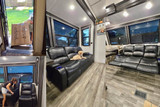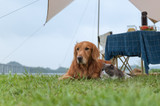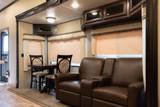Celebrating American Labor and the End of Summer
Soon, people will celebrate what has become known as the traditional “End of Summer,” the Labor Day weekend. This year, 2020, has been unusual, to say the least, but Monday, September 7 is Labor Day and a three-day weekend. For some RVers and campers, this will be the final weekend of experiencing the RV lifestyle, and, for others it will signal the quest to prepare for colder temperatures and possibly warmer climates.
Campgrounds in state and national parks will be crowded for sure. But, even entry into these popular places may be impacted by the Labor Day rush. An estimated 300,000 people visited national parks in September of 2015. Last year, National Parks recorded a record-making visitation count, with 327.5 million visitors, marking the fifth consecutive year of more than 300 million visitors. While not all of these are campers in RVs or Travel Trailers in tow, crowds at parks on Labor Day weekend may mean long waits for admission.
But it just won’t be the campgrounds that will be crowded. Most people who celebrate the three-day weekend have previously opted for a road trip. An estimated 25% of Americans travel more than 50 miles for the weekend and most of these drive to their holiday destination. This year of the Corona Virus, that trend is likely to continue. Although more people are contemplating airplane travel, the RV industry has been reporting increased sales as families view RVing as an alternative to confined indoor spaces and questionable sanitary conditions of airplanes, airports and hotels.
Labor Day is one of the five favorite holidays enjoyed by Americans, coming in after Christmas and Thanksgiving. Among the most popular past Labor Day activities are barbecues, beach visits, ball games and shopping for deals. Some of these have been affected by Covid-19, for sure, such as the major league ball games, but others are likely to remain popular, although scaled down. Take barbecuing for example. An estimated 49% of Americans fire up the grill and cook their Labor Day meals. And on the menu is likely hot dogs, which are consumed at a rate of more than 800 per second from Memorial Day in May through Labor Day in September.
So, why is this holiday so ingrained in the American experience? Generations ago, school did not start until after the holiday for some geographic areas. In high society, wearing white after Labor Day became a fashion faux pas because that is when the summer clothes were packed away, anticipating the change in seasons.
The holiday is also significant because it celebrated the roles everyday Americans play in driving the US economy and recognizes the strides that have been made in labor laws, such as the 8-hour work day, Monday through Friday work week, occupational safety and other accomplishments.
Labor Day was initially developed in the 1800’s by unions to acknowledge the contributions of workers and provide a day to spend with their families. The typical day for an American worker a century and a half ago was 12 to 14-hour days, a day off every other Sunday, and a day off on Christmas and the Fourth of July.
The first Labor Day parade was held in New York City in 1882 with 10,000 workers taking part. Other cities had similar celebrations and worker commemorations.
President Grover Cleveland made Labor Day a national holiday in 1894, on the heels of a strike of union workers at the Pullman Car Company in Chicago and a union call for a boycott of all Pullman rail cars. This strike was quelled by federal forces, sparking riots. This is just one of the many incidents that brought about changes benefiting the American workforce in the early days of industrialization.
Although the unions were instrumental in supporting Labor Day and the changes in working conditions, Labor Day was adopted by all workers as their holiday.
Here’s how to make the best of your Labor Day holiday:
- Plan ahead. Forget spontaneity. Campgrounds will fill up fast. If you haven’t already made reservations, do so ASAP. Look for alternatives to the most popular destinations.
- Check your rig. Make sure your RV or travel trailer is ready to go. Check the tire pressure and fluids. Emergency road service anytime is frustrating and annoying, but holiday weekends can be especially frustrating. After all, road service personnel are also hoping to enjoy their weekend.
- Adjust your schedule. Plan to travel before or after the peak travel days, such as Wednesday before the holiday or after the holiday. People tend to make the most of their three-day weekend by hitting the roads on Thursday and heading home late Monday or Tuesday. Consider traveling later at night or earlier in the day to avoid the peak travel times.
- Use technology to your advantage. Map out your intended routes with GPS or other mapping software. This lets you find alternative routes that avoid road construction or other delays. Check the route periodically throughout the weekend for unexpected delays or road closures.
- Work as a team. Switch driving duties and navigation duties with someone else in your rig. Driving fatigue and being distracted while trying to read a map or GPS screen are contributing factors for an accident. Cut back on these by asking for help.
- Follow the rules – of the road. Defensive driving is always a good practice, but even more so when roads and highways are crowded. These are the everyday common-sense rules that make the roads safer for everyone. Follow the speed limit, don’t follow to close, watch out for hazards in the road.
Even though this year has thrown a curve ball into our views of “normal”, Labor Day is still an important tradition. Enjoy this end of summer celebration with close family, friends and other like-minded Americans, but do so safely and cautiously. You’ve worked hard, enjoy this day dedicated to you.
Recent Posts
-
Traveling to the RV Hall of Fame in Elkhart, IN
If you are traveling to Elkhart, IN to see the RV Hall of Fame, getting off the toll road at exit 96 …Nov 14, 2025 -
Best RV Air Conditioners of 2025: An Expert Guide From RecPro
Quick Answers Best overall RV air conditioner: RecPro 15K Quiet AC with Heat Pump (RP-AC3800) Best f …Oct 29, 2025 -
The Nuclear Nomads Expand Sofa with New Recliner Section Install
The Nuclear Nomads are a full time RV family living in south Florida. Andi and Joey value quality ti …Oct 24, 2025 -
Trailer Wiring Guide: How to Wire Your Trailer for Safety and Efficiency
Table of Contents 1. Common Types of Trailer Connectors 2. Trailer Wiring Diagrams: Color Codes and …Aug 20, 2024 -
How to Keep Your Pets Safe While Camping
RVing and camping are a great getaway from the hustle and bustle of work and the city and the day-to …Jul 02, 2024 -
Why Replace Your RV Furniture?
You may wonder when is the best time to replace your RV furniture. There is no one right answer to t …May 20, 2024







